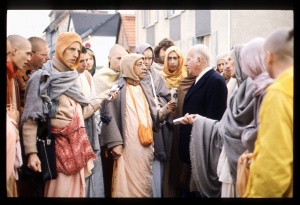SB 7.5.5

A.C. Bhaktivedanta Swami Prabhupada
TEXT 5
- śrī-prahlāda uvāca
- tat sādhu manye 'sura-varya dehināṁ
- sadā samudvigna-dhiyām asad-grahāt
- hitvātma-pātaṁ gṛham andha-kūpaṁ
- vanaṁ gato yad dharim āśrayeta
SYNONYMS
śrī-prahlādaḥ uvāca — Prahlāda Mahārāja replied; tat — that; sādhu — very good, or the best part of life; manye — I think; asura-varya — O King of the asuras; dehinām — of persons who have accepted the material body; sadā — always; samudvigna — full of anxieties; dhiyām — whose intelligence; asat-grahāt — because of accepting the temporary body or bodily relations as real (thinking "I am this body, and everything belonging to this body is mine"); hitvā — giving up; ātma-pātam — the place where spiritual culture or self-realization is stopped; gṛham — the bodily concept of life, or household life; andha-kūpam — which is nothing but a blind well (where there is no water but one nonetheless searches for water); vanam — to the forest; gataḥ — going; yat — which; harim — the Supreme Personality of Godhead; āśrayeta — may take shelter of.
TRANSLATION
Prahlāda Mahārāja replied: O best of the asuras, King of the demons, as far as I have learned from my spiritual master, any person who has accepted a temporary body and temporary household life is certainly embarrassed by anxiety because of having fallen in a dark well where there is no water but only suffering. One should give up this position and go to the forest [vana]. More clearly, one should go to Vṛndāvana, where only Kṛṣṇa consciousness is prevalent, and should thus take shelter of the Supreme Personality of Godhead.
PURPORT
Hiraṇyakaśipu thought that Prahlāda, being nothing but a small boy with no actual experience, might reply with something pleasing but nothing practical. Prahlāda Mahārāja, however, being an exalted devotee, had acquired all the qualities of education.
- yasyāsti bhaktir bhagavaty akiñcanā
- sarvair guṇais tatra samāsate surāḥ
- harāv abhaktasya kuto mahad-guṇā
- manorathenāsati dhāvato bahiḥ
"One who has unflinching devotional faith in Kṛṣṇa consistently manifests all the good qualities of Kṛṣṇa and the demigods. However, he who has no devotion to the Supreme Personality of Godhead has no good qualifications because he is engaged by mental concoction in material existence, which is the external feature of the Lord." (SB 5.18.12) So-called educated philosophers and scientists who are simply on the mental platform cannot distinguish between what is actually sat, eternal, and what is asat, temporary. The Vedic injunction is asato mā jyotir gama: everyone should give up the platform of temporary existence and approach the eternal platform. The soul is eternal, and topics concerning the eternal soul are actually knowledge. Elsewhere it is said, apaśyatām ātma-tattvaṁ gṛheṣu gṛha-medhinām: (SB 2.1.2) those who are attached to the bodily conception of life and who thus stick to life as a gṛhastha, or householder, on the platform of material sense enjoyment, cannot see the welfare of the eternal soul. Prahlāda Mahārāja confirmed this by saying that if one wants success in life, he should immediately understand from the right sources what his self-interest is and how he should mold his life in spiritual consciousness. One should understand himself to be part and parcel of Kṛṣṇa and thus completely take shelter of His lotus feet for guaranteed spiritual success. Everyone in the material world is in the bodily conception, struggling hard for existence, life after life. Prahlāda Mahārāja therefore recommended that to stop this material condition of repeated birth and death, one should go to the forest (vana).
In the varṇāśrama system, one first becomes a brahmacārī, then a gṛhastha, a vānaprastha and finally a sannyāsī. Going to the forest means accepting vānaprastha life, which is between gṛhastha life and sannyāsa. As confirmed in the Viṣṇu Purāṇa (3.8.9), varṇāśramācāravatā puruṣeṇa paraḥ pumān viṣṇur ārādhyate: (CC Madhya 8.58) by accepting the institution of varṇa and āśrama, one can very easily elevate himself to the platform of worshiping Viṣṇu, the Supreme Personality of Godhead. Otherwise, if one remains in the bodily conception, one must rot within this material world, and his life will be a failure. Society must have divisions of brāhmaṇa, kṣatriya, vaiśya and śūdra, and for spiritual advancement one must gradually develop as a brahmacārī, gṛhastha, vānaprastha and sannyāsī. Prahlāda Mahārāja recommended that his father accept vānaprastha life because as a gṛhastha he was becoming increasingly demoniac due to bodily attachment. Prahlāda recommended to his father that accepting vānaprastha life would be better than going deeper and deeper into gṛham andha-kūpam, the blind well of life as a gṛhastha. In our Kṛṣṇa consciousness movement we therefore invite all the elderly persons of the world to come to Vṛndāvana and stay there in retired life, making advancement in spiritual consciousness, Kṛṣṇa consciousness.